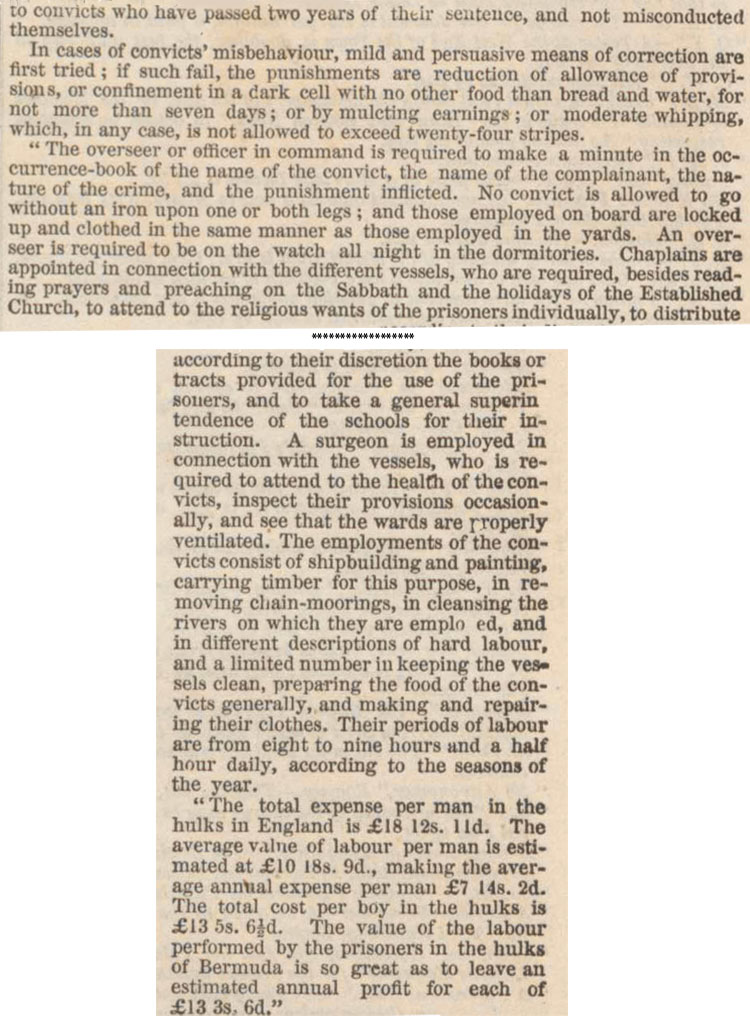Extracts from London Illustrated News, 21 February 1846, page 125 (ZPER 34/8)
Transcript
… to convicts who have passed two years of their sentence, and not misconducted themselves.
In cases of convicts misbehaviour, mild and persuasive means of correction are first tried. If such fail, the punishments are reduction of allowance of provisions, confinement in a dark cell with no other food than bread and water, for not more than seven days; or by mulcting earnings; or moderate whipping, which, in any case, is not allowed to exceed twenty four stripes.
“The overseer or officer in command is required to make a minute in the occurrence-book of the name of the convict, the name of the complainant, the nature of the crime, and the punishment inflicted. No convict is allowed to go without an iron upon one or both legs; and those employed on board are locked up and clothed in the same manner as those employed in the yards. An overseer is required to be on the watch all night in the dormitories. Chaplains are appointed in connection with the different vessels, who are required, besides reading prayers and preaching on the Sabbath and the holidays of the Established Church, to attend to the religious wants of the prisoners individually, to distribute …
***
…according to their discretion the books or tracts provided for the use of the prisoners, and to take a general superintendence of the schools for their instruction. A surgeon is employed in connection with the vessels, who is required to attend to the health of the convicts, inspect their provisions occasionally, and see that the wards are properly ventilated. The employments of the convicts consist of shipbuilding and painting, carrying timber for this purpose, in removing chain-moorings, in cleansing the rivers on which they are employed, and in different descriptions of hard labour, and a limited number in keeping the vessels clean, preparing the food of the convicts generally, and making and repairing their clothes. Their periods of labour are from eight to nine hours and a half hour daily, according to the seasons of the year.
“The total expense per man in the hulks in England is £18 12s. 11d. The average value of labour per man is estimated at £10 18s. 9d. making the average annual expense per man £7 14s. 2d. The total cost per boy in the hulks is £13 5s 6½d. The value of the labour performed by the prisoners in the hulks of Bermuda is so great as to leave an estimated annual profit for each of £13 3s. 6d.”
Notes
1. The overseer would submit quarterly returns to the Home Office (HO). These sworn lists of convicts give particulars as to the ages, convictions and sentences, health & behaviour of prisoners on board the convict hulks (until 1861) and are recorded in files at The National Archives in series HO 8.
2. It is worth noting that the date of this article (1846) is almost 40-years after the detention and transportation of James Butler and the other hulk refusers (1808). It is clear that by the mid nineteenth century prison hulks were seen as places of detention/punishment in their own right rather than as transitory holding places pending transportation. Although many prisoners did serve out their sentences on the hulks at the beginning of the century, it was always intended that they would only serve on the hulks for a limited time before being transported to the southern hemisphere.
